News
Famous Climatologist Prof. Gordon McBean and the Lead Economist of the World Bank Climate Change Group Stephane Hallegatte Met with Industrialists at ICI's Green Agenda Talks
- 17.09.2021
- News
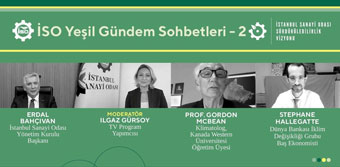
The Istanbul Chamber of Industry (ICI) brings together the two world-leading experts on climate change with industrialists at the second meeting of the "ICI Green Agenda Talks" initiated as part of its sustainability vision. Prof. Gordon McBean, a climatologist and a member of the Canadian Western University faculty, and Stephane Hallegatte, the Lead Economist of the World Bank Climate Change Group, took part in the "Global Perspective on Climate Change and Managing the Crises" panel, which was hosted online by ICI Chairman Erdal Bahçıvan to discuss the latest developments. Erdal Bahçıvan, the Chairman of ICI, and other experts stressed the importance of worldwide cooperation in the battle against climate change.
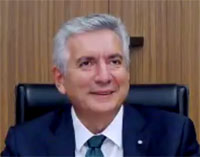
ICI's Chairman Erdal Bahçıvan
In his opening statement, ICI Chairman Bahçıvan stated that many extraordinary natural events and disasters we have been experiencing in recent years have made global warming and climate change a more likely scenario for the future, something scientists have been underlining for years. “This fact which has been intensely voiced by the scientific world decades ago is now felt more than ever” said Bahçıvan. "Scientists were listing the scenarios for the world in the coming decades, unless greenhouse gas emissions are limited: the rainfall patterns in the world will change. Ecological systems will be destroyed. Biodiversity will decrease. The sea level will rise. Deforestation will increase. Water resources will be polluted, dry up, and the number of wetlands will decrease. Desertification will begin. More landslides and erosion will take place. Hurricanes and floods would cause major devastation. It will not be possible to prevent fires. Agricultural yields will decrease. There will be no way to prevent climate migration."
Bahçıvan pointed out that many of these scenarios were just a fabricated scenario of a fictional future for governments and leaders in the 1990s. “We need to ask which one of these disasters is not witnessed in our world? For the last 4-5 years, especially for the last one year, the consequences of global warming that was put in front of them years ago have, unfortunately, been increased with extreme weather events, fires, floods, hurricanes, and many other disasters. This vital issue should now be removed from the meeting rooms and become a priority for individuals”. Bahçıvan pointed out the need for politicians, scientists, artists, and the business world to talk about climate change, to listen to science, and to communicate the need for urgent measures.
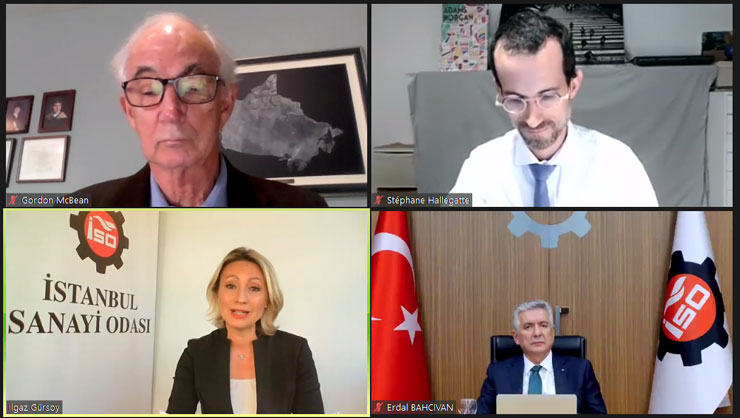
Bahçıvan: “This difficult process is now transforming from a remote threat into an existential and urgent situation every single day. Building a more sustainable world is now the only option we have to offer in order to secure life, not an alternative policy option. Todaye, we, as industrialists, have two basic questions to ask: How is this transformation going to take place and are we going to be able to respond to it in time? Looking at all these developments taking place around us, we should be able to say that: Regardless of our identities, our countries, our belonging, for whatever reason we exist, the only thing we need to undisputedly agree is to leave a habitable world for our children, young people, and future generations. If we, as humanity, are sincere in transferring our world to the next generations as a habitable planet under humane conditions, the only thing we will agree on is to be aware of all the risks and threats that await us. Moreover, we should take action on this issue without wasting any time for a global consensus on the solutions that the scientific world has put in front of us.”
Pointing out that industrialism has given them an understanding of a profession related to acting with full responsibility at all points of social life, as well as producing, Bahçıvan said that for this reason, they consider it their most important principles and policies to act with awareness of what they consume when investing and producing. “We are aware of the fact that this is the point where maintaining sustainability begins”.

Ilgaz Gürsoy
After the opening speech, a panel with the topic of “Global Perspectives on Climate Change and Managing the Crises” was held with the moderation of journalist Ilgaz Gürsoy.
McBean: "Life takes precedence over political interests”
Prof. Gordon McBean, a climatologist and faculty member of the Canadian Western University, spoke at the ICI Green Agenda Talks on the "Global Perspective on Climate Change and Managing the Crises" panel, pointing out that global concerns are intertwined, but solutions are dispersed. "This is not the way to solve climate change, this is the recipe for disaster," said McBean.
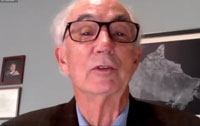
Prof. Gordon McBean
Climatologist and Faculty
Member of the Canadian
Western Member University
McBean emphasized the need to take action to prevent natural disasters and to invest in addressing the climate crisis. "For this, we first need to establish global cooperation” he said. “Life has a much higher priority than political interests. International cooperation is a must. The activity of one country should not harm neighboring or other countries. Both the scientific-based organizations and governments need to display an integrated approach. One of the most important issues is to create solutions on how to affect the poor in societies. Financial support is also vital for underdeveloped and developing countries."
Addressing the importance of disaster management in his speech, McBean said; “There was an ice storm in Canada in 1998. The storm caused so much damage to the electrical systems that Montreal and its surroundings suffered more than a month of blackouts. Along with economic issues, adults and children also faced serious mental problems. Unfortunately, no one had foreseen this kind of crisis prior to the disaster. We have seen stress come out of these situations. In addition to global cooperation in disaster management, the scientific world and all the industries should work together and think about solutions systematically. After obtaining information about the long-term risks that may occur in a given region or industry, a risk screening should be performed. To what extent can the capacity of public spaces respond to disasters? In addition, how the mental health of communities affected apart from economic effects? Solutions should be created to solve these. On the other hand, we must ensure that a country's activities do not have a negative impact on its neighbors."
McBean mentioned the necessity for benefit/harm analyses to mitigate the effects of climate change, as well as initiatives that bring together local actors and international programs. “We can think of it as an investment strategy," said McBean and added: “Not every part of the world is affected by climate change in the same way. For example, in Canada we are three times more affected. We need to take this information and organize it by region. The most important thing is to have an integrated alerting system at the local level. For instance, meteorology in Canada does not only provide scientific information but also gives it in a way that everyone can understand. It is necessary for states and scientific organizations to think and act together."
Hallegatte: "GDP is not the only indicator of prosperity; we need a joint together with the environment"
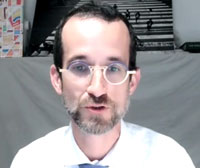
Stephane Hallegatte Lead
Economist of the World Bank
Climate Change Group
Stephane Hallegatte, the Lead Economist of the World Bank Climate Change Group, said that there is too much focus on Gross Domestic Product (GDP) for economic development today. “GDP is an important indicator of improving the quality of life, but it cannot be an indicator of prosperity alone. We need to act in conjunction with the environmental conditions. We have to figure out how to measure environmental protection while maintaining economic growth. Access to services or inequality are also important indicators. You are considered poor when you have no access to certain services, regardless of how high your income level is.”
Hallegatte also mentioned the transformation in energy and the necessity to look at the energy system as a whole. “Electricity generation needs to be net carbon zero by 2040. It is possible to achieve zero emissions through a collective action. Countries such as the United States, China, and South Korea are committed to becoming “zero”. It would benefit all countries to be involved in this transformation. One has to think about being on the right side at the end of the story, and should not hold out. The transformation both in the world and in Türkiye in the last five years has been striking. We all agree on the transformation. The main concern is how to achieve this transformation. The more we cooperate globally and ensure the cooperation of countries, the better the results we get. In order to achieve a smooth transformation, cooperation is critical. It is important to cooperate not only between governments but also between industries, chambers of commerce and industries.”
Hallegatte stated that the effects of nuclear power plants on the climate crisis are controversial and added: “Nuclear energy is a carbon-zero source of electricity generation, but it is much more expensive and carries great risk. Alternatively, renewable energy sources such as solar and wind can be used. Such technologies have low risk, plus even though carbon capture technologies have entered the market slowly they will be more widespread in the coming years. Coal is also more expensive in the long run than renewable energy. New coal projects are not in line with climate targets, but solutions should be offered to the people working in these industries as well.
“All countries have their own successes and weaknesses. The share of renewable energy in Türkiye at the beginning of the 2000s was close to zero, but now it is around 15 percent. This is such an important achievement. Again, you had losses in terms of land, but the Government acted successfully in favor of deforestation."
Hallegatte stated that it is necessary to think that crises are short-term now, not long-term and that we should not forget the opportunities that they have created. “For example, many people lost their jobs during the Covid-19 process. We may think about the employment problem with the climate catastrophe to create new job possibilities in the field of ‘environmental management’, because natural disasters like fires and floods necessitate additional human resources in this field. There is also a risk of earthquakes in Türkiye. Choosing to build energy-efficient buildings presents enormous possibilities, as Türkiye has a market of around $30 billion, large enough to employ 1 million people in this field. Again, Türkiye should closely monitor the changes in vehicle technologies. Some large companies in Europe have switched to zero carbon steel technology for their vehicles. I know that Türkiye has great investment plans regarding this matter, but other sectors should also be a part of the transformation process." Hallegatte stressed that the World Bank is always ready to support Türkiye as a strong partner.
McBean and Hallegatte also answered numerous questions from the audience at the end of their speech.